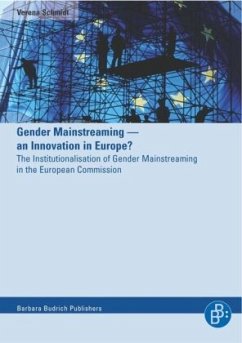The concept of gender mainstreaming has experienced an unexpected boom in the European Union and beyond since the United Nations World Conference of Women in Beijing in 1995. Starting from the evolution of gender mainstreaming, this book examines the extent to which gender mainstreaming can be regarded as an innovation and as an institution in a complex organisation like the European Commission. By ensuring that the effects on both genders of all policies and organisational processes are taken into account, gender mainstreaming seeks to bring what are often marginalised as ´women´s concerns´ into the mainstream of the analysis. Gender mainstreaming is often regarded as a paradigm shift compared to previous concepts of equal treatment and positive action programmes.
Schmidt's work is original in that it is based on an empirical analysis of gender mainstreaming within an organization.International Labour Review Die Studie gewährt einen guten Einblick in die Komplexität der Implementationsbedingungen in der Europäischen Kommission. Damit tägt sie dazu bei, die Diskussionen um GM [Gender Mainstreaming] empirisch fundiert führen zu können. Dies hebt das Buch aus der Fülle der inzwischen kaum noch zu überblickenden Publikationen zu GM hinaus.Michael Meuser in Kölner Zeitschrift für Soziologie und Sozialpsychologie

